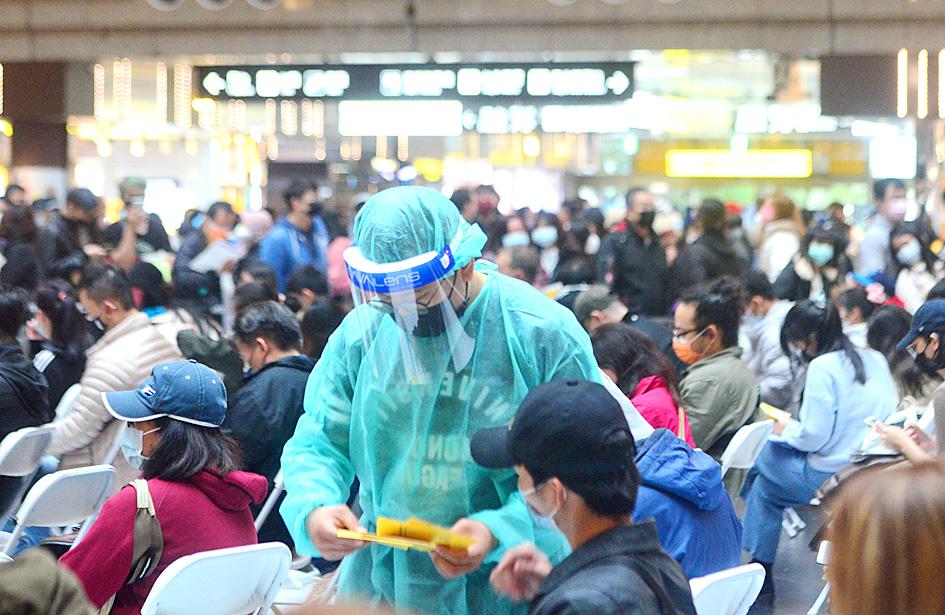The Central Epidemic Command Center (CECC) yesterday announced enhanced disease prevention measures for public transportation, business venues, religious venues and events, as well as the management of migrant workers, citing an increased risk of COVID-19 transmission in Taiwan.
The center yesterday reported 82 local cases, the highest daily number since June last year.
The majority of them can be traced to two clusters: one linked to employees — mainly migrant workers — at an electronics company in Taoyuan, and the other linked to a maintenance worker at the Port of Kaohsiung, the CECC said.

Photo: Wang Yi-sung, Taipei Times
Minister of Health and Welfare Chen Shih-chung (陳時中), who heads the center, said the two clusters have increased the risk of local transmission, so enhanced measures would be implemented nationwide.
Minister of Transportation and Communications Wang Kwo-tsai (王國材) said that starting today, eating and drinking would be banned on all public transport: airplanes, boats, buses and trains, including high-speed trains.
The only exceptions would be drinking water if needed physiologically, for taking medicine or breastfeeding, Wang said.

Photo: CNA
Public transport stations, national scenic areas and post offices have been asked to thoroughly implement contact registration and increase the frequency of environmental disinfection to meet the standards of a level 3 COVID-19 alert, he said, adding that additional cleaning and disinfection of handrails, buttons, restroom doorknobs and tray tables would be conducted.
Wang said the procedure of assigning international travelers to disease prevention taxis has been improved to ensure that there is no physical contact, and disease prevention vehicles would have their own completely separate areas at freeway rest stops.
Deputy Minister of Economic Affairs Chen Chern-chyi (陳正祺) said that his ministry has urged companies with facilities near clusters in Taoyuan or which have employees who are suspected of having been exposed to confirmed cases to conduct rapid COVID-19 testing of staff.
The ministry also encourages all companies nationwide, especially those with more than 100 employees, to conduct rapid COVID-19 testing of their employees, he said, adding that the ministry can help match companies with test kit manufacturers.
Chen Chern-chyi asked convenience stores, supermarkets and restaurants to thoroughly implement contact tracing, temperature measurement and other preventive measures.
It is suggested that employees of these businesses in Taoyuan take a rapid test for COVID-19, even if they are fully vaccinated.
Minister of the Interior Hsu Kuo-yung (徐國勇) said that as many people are expected to attend religious events during the Lunar New Year holiday, his ministry has asked religious groups to not hold events at which crowds would inevitably gather, such as pilgrimages, parades and incense stick offering races.
Religious groups must submit a COVID-19 safety plan and gain local government approval if they are to hold a religious event for more than 500 participants, he said, adding that contact tracing, temperature measurements and disinfection must be implemented.
Religious workers and visitors at religious venues and events must wear a mask at all times and are banned from eating or drinking. Religious venue staff must be fully vaccinated against COVID-19.
Visitor capacity at religious venues and events should be limited to a crowd density of one person per 2.25m² indoors and one person per 1m² outdoors, entrances and exits should be separated, and visitors must move through the venue in one direction and keep a proper social distance when lining up, Hsu said.
Meals at religious events can only be offered in sealed containers, and packing or eating the food on site is prohibited, he said, adding that as the venues are banned from providing divination sticks, divination blocks and food offering plates, people are encouraged to bring their own if they need to.
Accommodation for visitors at religious venues is limited to one person per room, or one family per room, he added.
Minister of Labor Hsu Ming-chun (許銘春) said that in response to the infection cluster at the Taoyuan company linked to two migrant workers who ate at a steakhouse where a cluster of infections has occurred, her ministry has asked their employers and recruitment agencies to cooperate with CECC testing and contact tracing.
The Taoyuan Department of Labor has inspected the migrant workers’ dormitory and found that it met disease prevention guidelines, she said, adding that the migrant workers who have been identified as close contacts of confirmed cases have been asked to stay in their dormitories for testing and contact tracing.
The employers and recruitment agencies would provide meals and other necessities for them, she said.
The Ministry of Labor has also launched response measures, including testing of employees at companies with 50 or more migrant workers, recruiting bilingual staff to assist in contact tracing, enhancing inspections, encouraging migrant workers to get fully vaccinated, and translating the CECC’s disease prevention information and sending it to migrant workers through multiple channels.

MORE VISITORS: The Tourism Administration said that it is seeing positive prospects in its efforts to expand the tourism market in North America and Europe Taiwan has been ranked as the cheapest place in the world to travel to this year, based on a list recommended by NerdWallet. The San Francisco-based personal finance company said that Taiwan topped the list of 16 nations it chose for budget travelers because US tourists do not need visas and travelers can easily have a good meal for less than US$10. A bus ride in Taipei costs just under US$0.50, while subway rides start at US$0.60, the firm said, adding that public transportation in Taiwan is easy to navigate. The firm also called Taiwan a “food lover’s paradise,” citing inexpensive breakfast stalls

TRADE: A mandatory declaration of origin for manufactured goods bound for the US is to take effect on May 7 to block China from exploiting Taiwan’s trade channels All products manufactured in Taiwan and exported to the US must include a signed declaration of origin starting on May 7, the Bureau of Foreign Trade announced yesterday. US President Donald Trump on April 2 imposed a 32 percent tariff on imports from Taiwan, but one week later announced a 90-day pause on its implementation. However, a universal 10 percent tariff was immediately applied to most imports from around the world. On April 12, the Trump administration further exempted computers, smartphones and semiconductors from the new tariffs. In response, President William Lai’s (賴清德) administration has introduced a series of countermeasures to support affected

CROSS-STRAIT: The vast majority of Taiwanese support maintaining the ‘status quo,’ while concern is rising about Beijing’s influence operations More than eight out of 10 Taiwanese reject Beijing’s “one country, two systems” framework for cross-strait relations, according to a survey released by the Mainland Affairs Council (MAC) on Thursday. The MAC’s latest quarterly survey found that 84.4 percent of respondents opposed Beijing’s “one country, two systems” formula for handling cross-strait relations — a figure consistent with past polling. Over the past three years, opposition to the framework has remained high, ranging from a low of 83.6 percent in April 2023 to a peak of 89.6 percent in April last year. In the most recent poll, 82.5 percent also rejected China’s

PLUGGING HOLES: The amendments would bring the legislation in line with systems found in other countries such as Japan and the US, Legislator Chen Kuan-ting said Democratic Progressive Party (DPP) Legislator Chen Kuan-ting (陳冠廷) has proposed amending national security legislation amid a spate of espionage cases. Potential gaps in security vetting procedures for personnel with access to sensitive information prompted him to propose the amendments, which would introduce changes to Article 14 of the Classified National Security Information Protection Act (國家機密保護法), Chen said yesterday. The proposal, which aims to enhance interagency vetting procedures and reduce the risk of classified information leaks, would establish a comprehensive security clearance system in Taiwan, he said. The amendment would require character and loyalty checks for civil servants and intelligence personnel prior to